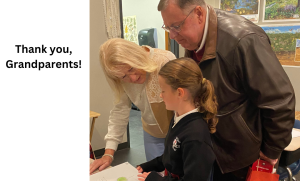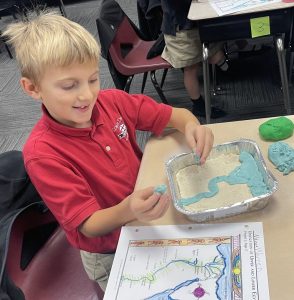Ava was in Mr. Saul’s Omnibus 3 class this past year. Below you’ll find the prompt Ava chose and a note from Mr. Saul.
What I Have Learned In Omnibus This Year
Throughout the course of this year, I have been exposed to many masterful works. These works have illuminated more of the war between good and evil in my mind, and helped to solidify what I believe about God and man. I have found many beautiful truths to hang on to, as well as many warnings to heed. I have learned much in this class not only through books, but through simply spending another year with my peers in a classroom setting. This paper will focus on what I have learned this year from a couple of books in particular, as well as what I have learned outside of books.
Uncle Tom’s Cabin is quite possibly one of the best books I have ever read. A few key things from it stood out to me. First of all, as illustrated by two men named Tom and Haley, it is dangerous to be stuck at the crossroads when it comes to understanding the difference between good and evil. Though it seemed at first that Tom was in a worse position, it is actually Haley who was in more danger, because he had a muddled view of good and evil. The devil can use this to his own advantage by making us think that good is evil and evil is good.
Another thing that stood out to me from Uncle Tom’s Cabin was the love for others that Uncle Tom himself had. He displayed the love of Christ by pleading with St. Clare to change his ways and accept God. From this I learned that if we have true faith in Christ and if we truly love others, we will not shy away from those hard but necessary conversations. The state of someone’s soul is too important to ignore.
Another book I loved reading this year was Frankenstein. I learned a lot from this book, like how to recognize when someone is either being passive or active with their gifts or their faith. For example, Victor Frankenstein appeared on the outside to be a very active person, but he was spiritually passive because he was letting his passions consume him in an ungodly way. He was so consumed with creating life that he missed the beauty of God’s creation right outside his window. He isolated himself and thus cut off his ability to truly love. Jesus says that the greatest commandments are to love God and love others, and He displayed this love by dying for us. God himself is love, and he designed love to be given away to others. Therefore, those who isolate themselves cannot truly love, because they have no one to give or show their love to.
The Great Gatsby is a book that powerfully displays the sheer grossness and insanity of sin. It was not a fun read for me, but it has helped me see more clearly that true fulfillment comes only from the Lord. The characters of this book—Daisy and Tom Buchanan, Jay Gatsby, etc.—are all looking to slake their thirst. The problem is that they’re looking in all the empty wells. There is a vast pit in our souls that cannot be filled with the rotting, crumbling things of this world. God is the only one big enough, strong enough, and loving enough to fulfill our hearts, and until we realize that, we will not be satisfied
Another thing I learned from The Great Gatsby is that one of the marks of maturity is moving from self to others. None of the characters in The Great Gatsby show maturity, because, like Frankenstein, they are obsessed with their own sinful desires. Though at first it may seem like Daisy and Tom truly love each other, in the end they abandon each other in order to look after number one. There is no true love without sacrifice, and the immature person is not willing to give up their own pleasures for those of another.
One other lesson I learned from The Great Gatsby is that we can’t fix the clock. In other words, we can’t go back and fix things that have already happened. Gatsby thought he could, but in the end he was unsuccessful because he was reaching for an unrealistic goal. That is why we must do what we can, with what we have, where we are, all for the glory of God. The only time we have is now, so we should strive to use it to love God and love others.
I have noticed some recurring themes in a couple of books we’ve read this year. One of them is the danger of desensitization. To be desensitized is to feel less emotion than normal, or to not display the proper emotion at the proper time. This can happen very easily with things that feel normal or common to us. In A Tale of Two Cities, it was the guillotine. The act of ending hundreds of innocent people’s lives was mere sport to the French revolutionaries, something to sit idly back and watch while chatting or knitting. Slavery is the same way, and so was the decadence of the Roarin' 20s. Often when we become familiar with things we misplace our values and take them for granted, something we as Christians should strive against.
Another thing I learned about through these books is the human tendency to shift the blame or not own up and take responsibility for our actions. This tendency is first displayed all the way back in the garden, when Adam and Eve shift the blame all over the place. Frankenstein does this by blaming fate for all the bad things that happen because of his creation. Daisy abandons Gatsby and lets him die alone because she didn’t want to admit that Myrtle’s blood was on her hands, not his. As humans we don’t like the discomfort of being in the wrong, so we try to pass the discomfort to someone else. This is not loving our neighbor as ourself, and therefore it is also another example of immaturity.
Throughout this year I have not learned only from books, but outside of books as well. The transition into high school was a hard one, and because it was hard I complained. I now realize that complaining never helps any situation, and on top of that it discourages other people and drags them down to join my pity party, which is not Christ-like at all. I have also learned to enjoy discussion and making connections. I used to be terrified of discussing, but now I love digging deep into a book with my classmates, hearing their beliefs and ideas, and sharing my own. Often I’ll find myself making connections between books we have read this year and other things unrelated to school, which I had never really noticed or thought about until this year. Above all I have learned more and more about the nature of my own sin, and my God who has saved me from it.




